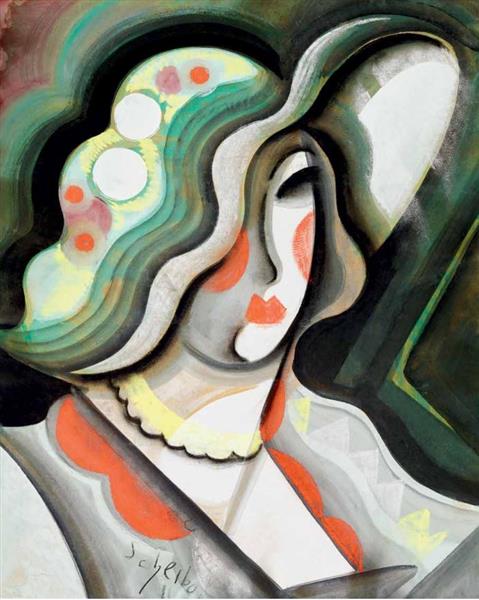Description
In the work "Kalapos N?" From Hugó Scheiber, a fascinating synergy is manifested between the aesthetics of the Art Deco and the representation of the female figure, becoming a notable example of the intersection between modernism and the artist's personal symbolism. Hugó Scheiber, an outstanding exponent of Hungarian art of the twentieth century, was known for his ability to merge the elegance of forms with a vibrant palette, a characteristic that becomes evident in this piece.
The composition of "Kalapos N?" It is essentially a portrait in which the female figure, elegant and enigmatic, captures the viewer's attention with its majestic bearing. The woman, whose face is slightly framed by a distinctive and ornate hat, seems to be immersed in a deep thought or contemplation. This psychological approach, typical of Scheiber's work, invites the interpretation and exploration of the emotional state of the model. The hat, with its stylized and recharged design, not only provides an element of modernity, but is also a symbol of fashion and female empowerment in the 1920s.
The use of color in "Kalapos N?" It is another aspect that deserves attention. Scheiber uses a range of rich and contrasting tones that evoke the vitality and complexity of the urban life of its time. The warm tones, especially yellow, gold and roses, combine with a more sober background, creating an atmosphere that resonates both with joy and a subtle melancholy. This duality not only reflects the vitality of the portrayed woman, but can also be interpreted as an allusion to the cultural and social tensions of the era.
The female figure in the center of the work is not just a representation of beauty; She becomes a symbol of freedom and modernity. In the context of Art Deco, which celebrated the elegance, sophistication and dynamism of the modern world, "Kalapos n?" It is a testimony of how fashion and art interacted to define the identity of women in a society in transformation. In addition, Scheiber's choice to portray a woman in this way can be interpreted as an act of claim, highlighting the role of women in art and society of their time.
The work also enrolls in the tradition of modern portrait, which often challenges past conventions and seeks to capture the essence of the subject in a context that goes beyond mere realism. In this sense, "Kalapos N?" It aligns with other contemporary artists who explored the human figure through innovative lenses. The influence of movements such as Cubism and Fauvism can be felt in the use of color and shape, although Scheiber maintains a uniqueness that is distinguished by its particular sensitivity towards the female figure.
"Kalapos N?" It is not only a reflection of Art Deco aesthetics, but also an affirmation of the role of women in art and its meaning within a broader social context. Through his ability to translate the nuances of the form and color in a captivating visual experience, Hugó Scheiber manages to not only commemorate a moment of modernity, but also to cause a dialogue about identity and representation in art. The work invites viewers to reflect on the same act of contemplating the female figure, suggesting that, in its elegance, a narrative of empowerment and cultural transformation resides. In this sense, "Kalapos N?" It is erected as a centerpiece in the exploration of art and the female figure, resonating with the lasting influence of the Art Deco in the history of art.
KUADROS ©, a famous paint on your wall.
Hand-made oil painting reproductions, with the quality of professional artists and the distinctive seal of KUADROS ©.
Art reproduction service with satisfaction guarantee. If you are not completely satisfied with the replica of your painting, we refund your money 100%.

